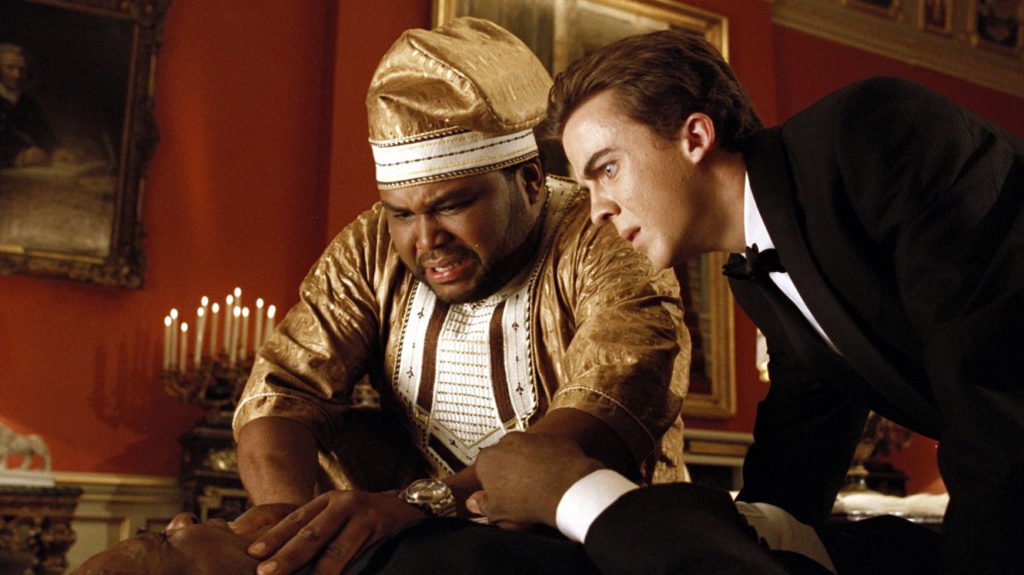
Last time, the world was threatened by microscopic nanobots. This time it’s mind-control software. But I’m getting ahead of myself. …
Cody Banks is now 16 and still a vital part of an undercover CIA operation that utilizes kids for espionage and crime fighting. To further his training, Cody has regularly joined hundreds of other youngsters at Kamp Woody, a place that pretends to teach a love of nature, basket weaving and swimming, but actually educates youngsters in hand-to-hand combat, weaponry and the fine art of dismantling a bomb. Parents remain clueless as to the James Bond-ish activities involved.
So, when Cody discovers that the head of the CIA’s venture for children (Victor Diaz) has a dark side, he’s forced to deal with it on his own. And dealing with that dark side is no small task. Diaz is bent on revenge and world domination, and he’s trying to use mind-controlling computer chips to pull it off.
Determined to foil this dastardly plan, Cody travels to London and poses as a clarinet virtuoso. (He’s one of a dozen prodigies invited to perform at a G7 banquet, an important location for Cody since Diaz wants to implant the chips into the teeth of G7 leaders.) Unfortunately, Cody’s “aide,” Derek, is a bit of an Inspector Clouseau, having been assigned London as a punishment for blundering an earlier assignment. And time is running out. Can Cody and Co. prevent the President of the United States, along with six other world leaders from becoming mere robots with Diaz at the controls?
If one overlooks for a moment that everything Cody does for the CIA is done without his parents’ knowledge—and therefore, without their approval—then it can be said that he exhibits selflessness and courage as he works on behalf of his country and for the benefit of all mankind. He repeatedly puts his life on the line (scaling buildings, dodging an elevator inside its shaft, saving a co-Kamper’s life, etc.).
Cody’s brother, Alex, comes across as jealous and manipulative, but Cody never lowers himself to his brother’s level. Instead, he gives Alex a few personal items as gifts. Derek, who might be a bit of a bumbler, has a big heart, lots of spunk and a willingness to do whatever it takes for the mission to succeed. He also puts himself at risk on behalf of Cody by attempting to distract the villainous Diaz.
Upon arriving at Kamp Woody, Cody’s younger brother voices his desire to “trade” his sibling “for a hot chick.” Cody and a young British secret agent exchange affectionate kisses—on the cheek.
The film opens with Cody kicking two fatigue-wearing individuals (we later find out they’re Kamp Woody “colleagues”) in a war-simulation game. A spy-gadget beanie baby malfunctions, attacking the face of the CIA director. CIA youngsters—both guys and girls—karate kick/chop soldiers who arrive at Kamp to snatch Diaz (they’re unaware he’s switched sides). Later, Diaz shoots two rocket grenades at Cody—missing, of course, but demolishing unintended targets (a car and a pallet of water cooler bottles). Cody and Diaz come to blows in a factory warehouse. Diaz pushes Cody out of a window and tries unsuccessfully to impale him with an elephant tusk. He slaps one of his cronies.
After commandeering a moped on the streets of London, Derek crashes through a glass window. While under Diaz’ mind control, he fights Cody and nearly sends him over a balcony.
There are no harsh profanities. Instead, characters say “pee,” “a–,” “suck” and “heck.” A musical number includes the expression, “Good God now!”
A CIA agent speaks matter-of-factly about how cold medicine has him “completely pickled.” One of Diaz’s co-villains (who smokes cigars) demonstrates the effectiveness of the mind-control software by using it to make a dog pour an alcoholic drink. More drinks are served at the G7 banquet. An incidental character smokes in a waiting room. Diaz’ reprehensible team utilizes a type of knockout gas.
It’s one thing for a CIA agent to deceive the enemy while on the job (something Cody does frequently). It’s quite another for a 16-year-old to extend that deception to his parents, keeping them in the dark about his missions. Gross-out humor gets a workout when Derek spills a urine sample to distract a guard (the fluid winds up on a sandwich—which is later eaten). One character gets hit in the groin. Derek enjoys listening to his rap music loudly (the disturbing artist Chingy is featured), and he admires a slasher film villain (“Freddy Krueger—that’s what I call a real killer”).
Agent Cody Banks 2: Destination London is one of those rare sequels that actually improves upon its predecessor (Agent Cody Banks). Gone are the x-ray glasses that allowed a younger Cody to see underneath women’s clothes. Gone is the ultra-slinky, cleavage revealing outfit worn by a saucy CIA agent. Gone are plastic breast-enhanced lessons on “how to mate.”
What remains, besides regular doses of tween-style action violence, is Cody’s refusal to tell his parents he’s working for the CIA. And that is perhaps movie 2‘s biggest drawback. (Additionally, the fibs he tells while on assignment could easily be interpreted by young viewers as license to lie in their own “adventures” at school and at home.)
Parents who decide to let their kids tag along on Cody’s latest mission should be careful to stage a family discussion afterwards, asking questions like, “Is it ever OK to lie?” “What about when something as big as national security is at risk?” “What should we do when authorities dole out conflicting instructions?” That’ll help turn onscreen misbehavior into off-screen life lessons.
